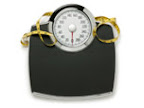Weight ain’t nothing but a number
by Carmen Stella
In today’s society people are hardly ever given a chance to celebrate and love their bodies just the way they are.
This is because we are living in a world that is obsessed with perfection. One of the main facets of this obsession that’s tipping the scales of debate is weight and body shape.
A recent study carried out by Dove showed that two thirds of women do not wish to engage in physical activities because they are not comfortable with the way they look.
Further to this, a recent survey claims that 9 in every 10 women worldwide wish to change some aspects of themselves - bodyweight and bodyshape being the main areas.
This is not surprising when in nearly every magazine we open we are bombarded with images and notions that skinny, and only skinny, is beautiful.
This isn’t helped by the recent coining of the term “rexy” by supermodel Kate Moss and a number of other ‘A’ list celebs who now use this word (a combination of anorexic and sexy) to compliment one another.
I think society needs to take a step back and realise that there is so much more to life than vying to be skinny.
And who can we point the finger of blame at? I’d rest some of the responsibility at the feet of magazine editors who continue to emblazon images of skinny models on their magazine covers.
Do these people not realise that what they are illustrating through their stories and pictures could be having a negative effect on many men and women around the world? Note to editors: not all of us aspire to be size zero.
I tried to contact a few magazine editors to find out if they felt any social responsibility regarding the types of model images they choose to promote on their publications’ front pages.
CLEO was first in my quest for answers and surprise, surprise, the Editor was away on a business trip in Hong Kong and no one else was prepared to comment on the issue. How convenient.
Cosmopolitan was another magazine I thought fit to get answers from, but no matter what I said the staff would not put me through to the Editor. My call has yet to be answered.
I don’t think my questions were answered by anyone because they all possibly, to some extent, either felt some degree of guilt, or would rather nor discuss such a hot topic. Who knows.
We are all unique, and one organisation that is helping to push this message out there is EDEN (Eating Difficulties Education Network).
EDEN is a proactive not for profit organisation operating in Auckland that acts as a support network for those dealing with eating difficulties such as aneroxia.
However, much of their work is also on a smaller level, as their main aim is promote body trust and satisfaction.
“Prevention is better than cure,” says Maree Burns, CEO of EDEN.
“People need to take body dissatisfaction seriously, just because someone hasn’t reached the stage of clinical intervention or even physical signs of a disorder, doesn’t mean that they suffer less mentally and emotionally,” says Maree.
Research has shown that body satisfaction boosts self-esteem and self worth and that having a positive body image reduces the risk of developing eating difficulties.
That is why EDEN work hard to push the message that diversity is a good thing, and that it needs to be accepted on an individual and a societal level.
EDEN are so passionate about what they do that they have this year decided to mark a day that will give everyone a chance to feel good in their own skin.
Love Your Body Day will be on the 14th October, and EDEN encourage everyone to make the most of this day. The core message being for people to accept who they are and be satisfied and happy that they are diverse and unique.